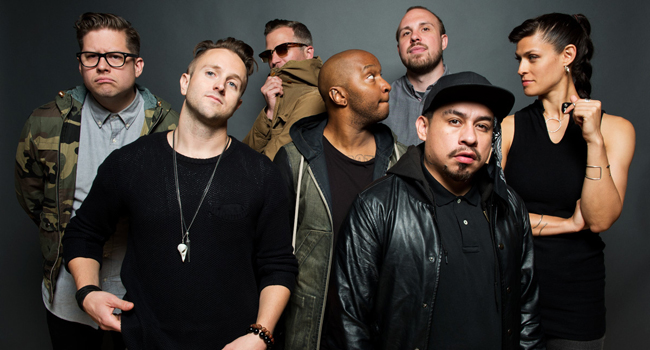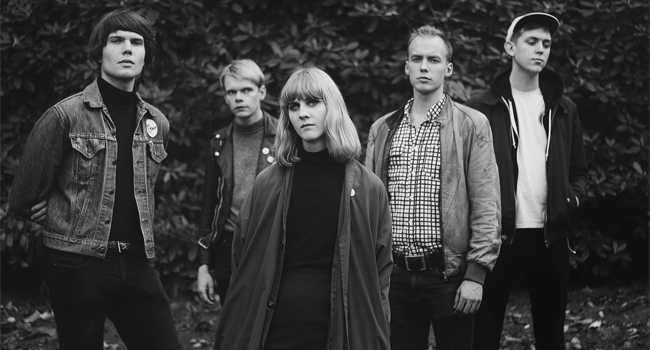The band name? An immediate red flag. How prototypically indie; anything involving an Indian and/or a bear. And how awful is it that we’re still referring to Native Americans as Indians? What a mouthful, couldn’t there be some punctuation in that?
Say what you will of novelty, but the boys and girl took their title from the name of a cyclical game—a sort of a full-body “Rock, Paper, Scissors” popular in the Midwest and Plains States (Cowboy trumps Indian trumps Bear trumps Cowboy), not that that makes it any more politically correct. According to legend, a friend of lead singer CJ Calhoun minted it first, Calhoun “buying” it from him for a six-pack of beer, a move he refers to with a smirk as “the best” the band has made.
Hailing from Lawrence, Kansas, Cowboy Indian Bear formed the way many bands now do, from the residue of others. Frontmen Calhoun and Marty Hillard had been playing together in nearby Topeka since the former was fifteen, while Katlyn Conroy and Beau Bruns were gigging around Lawrence in various outfits. Given the closeness of the “super supportive” Northeast Kansan scene, they were all familiar with one another before finding themselves bandless and in need of a new start. From the beginning, each member vowed not to sacrifice a bit of what they loved about music—producing some wild and disparate results.
It’s for this reason the band has flourished in the “post-album” world, what the band refers to as “a broken industry.” Rather than a concise story and unified style—Cowboy Indian Bear has no illusions about the digital age. Music has become expendable; every song readily available and readily tossed away. Their first LP, Each Other All The Time, was not an album in the traditional sense of a unified arc or genre, but an array of different styles the band used. Each Other All The Time took two years to record, and to its creators it’s an album in “a non-album generation.”
The band was in Chicago recently for a pair of shows, the first at Jerry’s, a small cocktail bar typically reserved for jazz, the other at Logan Square’s Burlington. The Jerry’s audience numbered about twelve souls all accounted for, but the band played with the force and intention for two hundred. There may have been jokes and banter between songs, even mock attempts at death metal, but each time the first chord was struck—the room was sucked into the sprawling, doleful noise, their delicate voices wavering over a night sky of sound. The band played songs of lost love, the road, detachment—all with the intent and energy of a first show.
With an aesthetic that pairs sour piano chords with ghostly three-piece harmonies, dance rhythms and wailing guitars with sensual and sinister lyricism—all undertaken with a big, western heart—it’s not hard to hear “pretty,” the band’s word of choice in describing their style.
Drummer Beau Bruns straddles the roles of rock drummer and percussionist deftly, stirring atmosphere and drive with the same strokes. Marty and CJ trade bass and guitar duties freely. Most songs have a tempered, downhome sound, each singer bringing something different to the feel. Calhoun’s voice is earnest and full-bodied, Katlyn’s airy and quivering, Marty’s delicate and vulnerable.
Comparisons have been drawn to everyone from TV On the Radio to Hot Chip to Fleet Foxes (CIB actually predates their 2008 debut.) The real trick has been losing the comparisons. The band’s sonic palette is so simple, so imitable that it almost seems facile. Beau, who is mostly quiet during the interview, chimes in, “When we’re writing a song, it’s mostly CJ saying, ‘Play less.’ Can you figure out how to play with more toms, less cymbals?’” As many acts find out the hard way, simplicity ain’t easy. For CIB, the difference is deliberate, meant to tease what Calhoun refers to as, “the crux” of the song.
Actually, the band has been fighting novelty their entire existence. “The drummer with glasses,” “The black guy with dreads,” “The tattooed chick on keys,” and of course, “The singer in plaid.”
Said Calhoun, “I’m a white dude from Kansas, of course I own flannel,” pausing a while and looking down in his cup, “And I shouldn’t have to justify it.”
They’ve been relentlessly hounded by labels and cries of “appropriation” “and “shtick,” especially because, as Marty put it, “We’re automatically ‘cultural.'” Katlyn, who had been playing under her own name as well as “Another Holiday” had long battled the label “cutesy,” because of her voice, despite her grim topics and lyricism.
At one show in Sioux Falls, the band broke into “Oh, Madison!” a song that begins with glockenspiel, carrying on in a jaunty sort of dance. As they finished, someone in the audience yelled, “Play another Vampire Weekend song,” to which Marty replied, (not to be out-childed,) “Play another Vampire Weekend song,” as the band broke into “Santiago” a crescendoing, lovelorn rocker with howling guitars and huge cymbal flourishes. The heckler apologized at close.
The band has cited quite a few influences, from musical (Radiohead’s In Rainbows), to literary (White Teeth by Zadie Smith) to the architectural. CJ recanted a part of their Chicago trip, standing outside clothing store JGRNAUT, looking up at the brown granite edifice and bay windows of the Manhattan Building, one of the world’s earliest skyscrapers. The band marveled at the craftsmanship and imagined the time put in, that goes otherwise unnoticed, obscured in the long shadows of the Printer’s Row neighborhood.
To Cowboy Indian Bear, an album is like a structure. Just as an architect is tasked with the responsibility of creating something meant to be permanent, that uses space, a limited resource, so too should artists seek to create an album meant to withstand the test of time. “How many people in Chicago do you think take the time to just look up?” Marty asked.
Cowboy Indian Bear treads the all-too-common dynamic of a band doing well on paper but in reality cutting their teeth. Having opened for Murder by Death, Peter Bjorn & John, The Appleseed Cast, played SXSW and been featured on Daytrotter, they continue to work dayjobs back in Lawrence. Their digital promotion is about as delightfully irreverent as the band’s namesake, the band’s Twitter account at one point continuously tweeting lyrics to Mario’s “You Should Let Me Love You.” Beyond Kansas, Omaha, Tulsa and a handful of other towns, their typical concert might be a scene very similar to Jerry’s.
“One word we would never use is rock stars,” Beau said, “We all got our noses down and it sucks ass but it’s the most positive ass-sucking possible.” With a split EP due out by the end of the year with Hospital Ships, Cowboy Indian Bear’s second full-length is due early 2013.




